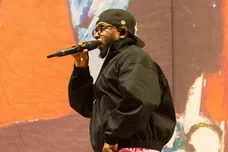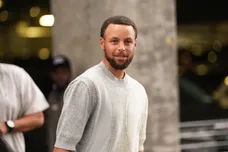Yesterday, The Game surprised us all by announcing that his long-awaited sequel to 2005's The Documentary would span two discs and 38 tracks. Unless you're a ride-or-die Game fan, this news may come as a disappointment. He's chosen to enter an arena that few rappers have emerged from unscathed, and regardless of his skills, "classic" double albums are much rarer than the bloated, overlong, filler-heavy monstrosities that became en vouge in the late '90s. It's a huge challenge, and not one that many artists (especially solo acts) have successfully tackled.
In fact, the first double album in rap history came courtesy of Will Smith and DJ Jazzy Jeff, whose He's The DJ, I'm The Rapper arrived in 1988 and didn't exactly make a convincing case for its 72 minute runtime. Perhaps due to Smith's relatively shallow storytelling, the novelty nature of some tracks, or the fact that disc two was a "bonus scratch album" dominated by Jeff, it didn't seem necessary for the album to drag on longer than one LP. Unsurprisingly, He's The DJ... wasn't responsible for many imitators, with the heyday of double rap albums instead coming on the heels of what is still arguably the format's crowning achievement: Tupac's 1996 opus, All Eyez On Me.
After this, it was off to the races, with a whole host of top-tier rappers trying to cram as many songs possible onto two discs for the next ten years. The approaches varied, from Wu-Tang's victory lap Wu-Tang Forever, to OutKast's one-disc-per-member oddity Speakerboxxx/The Love Below (which turns 12 today), but most still struggled to hold listeners' attentions for more than 45 minutes.
Double rap albums gradually fell out of fashion, but they still trickle out every now and then. (One of this year's best albums, Vince Staples' Summertime '06, is technically two discs, but its runtime is dwarfed by recent single LPs by Mac Miller, Travi$ Scott and Dr. Dre.) With The Game currently staring down the barrel of a very unreliable gun, we're taking a look at what has and hasn't historically worked for double albums in rap. Here are some tips that could ensure that The Documentary 2 lives up to its predecessor.
Already have a classic album under your belt

This one may seem like a no-brainer, with experience and a dedicated fanbase being two of the definite keys to double album success. Tupac dropped the monumental Me Against The World before All Eyez On Me, Wu-Tang of course had 36 Chambers, Biggie's Life After Death basically hinged on the success of Ready To Die, OutKast had... their first four albums (all classics)-- same for UGK, whose self-titled album is one of the most underrated double discs in history. Nowadays, very few sane major labels would let you waltz into the office and demand a double LP if you don't already have well-respected projects in your discography, but back in the double album boom times, that wasn't necessary.
In 1998, A&M Records let Kurupt make his debut album, Kuruption!, over two hours in length; Houston flash-in-the-pan Lil Flip was allowed to follow up Undaground Legend with the absurdly overstuffed U Gotta Feel Me in 2004; despite the success of his singles, Nelly's Sweat/Suit ended up heralding his downfall from pop stardom.
There are exceptions though, with many of rap's greats failing to bring the same fervor they brought on their classics to double LPs. Jay Z's Blueprint 2 was so superfluous that he released a one-disc version just five months later, and Nas' Street's Disciple is among the worst-received albums of his career. That being said, there have been very few great double albums that have come from relatively untested talents, with Dipset's career-making Diplomatic Immunity being the only one that currently springs to mind.
The Game did follow The Documentary up with a handful of solid projects, and he's obviously been saving the sequel for something very special, but in attempting to match that classic's status while doubling the length, he's still facing an uphill battle.
You're gonna need some guests... But not too many

I don't care how great of a rapper you are: you're not going to be able to carry two hours' worth of music all by yourself. Without exception, double albums always feature multiple MCs, whether it's a solo act bringing on features or a group teaming up for the whole project (even then, there are usually plenty of guest appearances). Tupac called upon his Thug Life and Outlawz sidekicks, the full Wu-Tang Clan assembled like Voltron, and UGK gathered pimps from around the country (including Too $hort, Charlie Wilson, Willie D and Big Daddy Kane), all leading to diverse projects that didn't force any single rapper to bear the full load.
On the other side of the coin, you don't what your double album to sound like a grab-bag of random rappers. The best example of this is Master P's MP Da Last Don, a 1998 album that features over 20 separate guests, most of them No Limit underlings who turned up on more than one track apiece. Were Game to adopt this approach, The Documentary 2 might be almost indistinguishable from last year's Year Of The Wolf, which would be a travesty, even if you were a fan of that album. On there, high-profile guests shared the spotlight with Blood Money's Skeme and Dubb, so maybe it's on the production side of things that Game needs to court bigger names. Lest we forget, a lion's share of The Documentary's success was due to credits that included Dre, Kanye, peak-era Scott Storch, Just Blaze and Timbaland.
Play to your strengths

As much as I personally love all-over-the-place projects like Tyler The Creator's recent Cherry Bomb, lengthier releases usually require some form of consistency. On the best double albums, you can draw a through-line that ties everything together-- All Eyez On Me was Pac's return to gangster rap after a few more solemn, conscious-minded releases; Life After Death had that eerily prescient paranoia of a young death running through every line; UGK could practically double as a textbook for aspiring pimps. There are also other ways to create that all-encompassing vibe that a two-hour listening experience needs, the most creative of which was deployed by OutKast on Speakerboxxx/The Love Below.
On that album's predecessor, Stankonia, a widening gap between Big Boi and Andre 3000 became apparent. The former was spending more time on ferocious street cuts like "Snappin' & Trappin" and "We Luv Deez Hoez," while the latter seemed intent on expanding the duo's sonic boundaries, taking a lead role on "Humble Mumble," "Stanklove" and other intergalactic tracks. Their decision to split their next album into two parts was a much-discussed, controversial move, and although the ensuing album didn't equal their previous successes, it remains a hugely influential, innovative double album 12 years after its first release.
Unless Game has some multiple personality issues we don't yet know about, he couldn't aspire to that same setup, but he could still learn a thing or two from the uninhibited sprawl of Speakerboxxx/The Love Below. The album had three of the biggest hits of Outkast's career sitting alongside jazz covers, rock ballads and the grittiest posse cuts they ever dropped. For someone like Game, who's relied on a pretty one-note strategy for the past few years (diss and name-drop whoever he can, acting like gangster rap's annoyed Blood uncle), this breadth of musical styles could provide some much-needed sonic diversity while his subject matter acts as the anchor.
It would certainly be a commendable feat if The Documentary 2 ends up being one of this year's most acclaimed albums, as it'll be presented in one of hip hop's most maligned formats, but Game could still have a few tricks up his sleeve.







